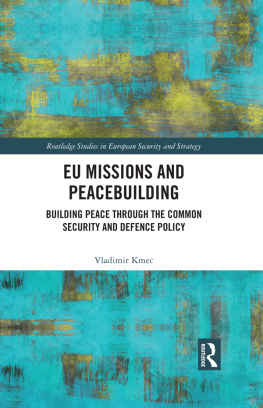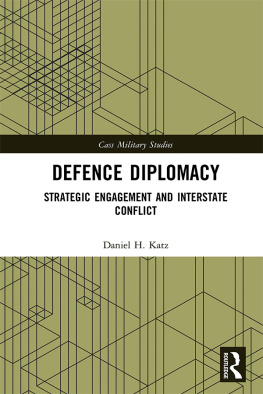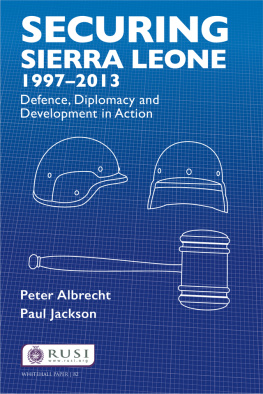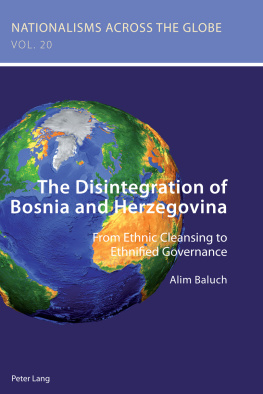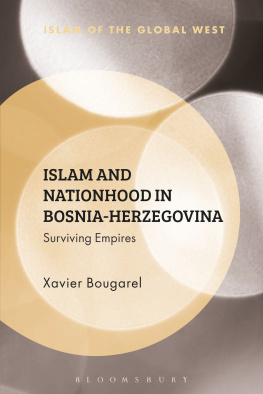Whitehall Paper 80
Destination NATO
Defence Reform in Bosnia and Herzegovina, 200313
Rohan Maxwell and John Andreas Olsen
www.rusi.org
Royal United Services Institute for Defence and Security Studies
Destination NATO: Defence Reform in Bosnia and Herzegovina, 200313
Rohan Maxwell and John Andreas Olsen
First published 2013
Whitehall Papers series
Series Editor: Professor Malcolm Chalmers
Editors: Adrian Johnson, Anna Rader and Ashlee Godwin
RUSI is a Registered Charity (No. 210639)
ISBN 978-0-415-71840-0
Published on behalf of the Royal United Services Institute for Defence and Security Studies
by
Routledge Journals, an imprint of Taylor & Francis, 4 Park Square, Milton Park, Abingdon OX14 4RN
SUBSCRIPTIONS
Please send subscription orders to:
USA/Canada: Taylor & Francis Inc., Journals Department, 325 Chestnut Street, 8th Floor, Philadelphia, PA 19106, USA
UK/Rest of World: Routledge Journals, T&F Customer Services, T&F Informa UK Ltd, Sheepen Place, Colchester, Essex CO3 3LP, UK
All rights reserved. No part of this publication may be reprinted or reproduced or utilised in any form or by any electronic, mechanical, or other means, now known or hereafter invented, including photocopying and recording, or in any information storage or retrieval system, without permission in writing from the publisher.
Rohan Maxwell is the senior political-military adviser at NATO Headquarters, Sarajevo (NHQSa). Maxwell served with the Canadian Army as a combat engineer from 1982 to 2005 and he is a graduate of the Canadian Army Command and Staff College. He earned a BSc in Physics and Computer Science, and an MA in War Studies from the Royal Military College of Canada.
In 2003 he was assigned to Bosnia and Herzegovina, initially to the staffof the Military Advisor to the High Representative and subsequently to the Defence Reform Section of the OSCE Mission to BiH. In this capacity he participated in the implementation of the initial BiH defence reform agreement of 2003 (two entity armies under one state-level roof) including, inter alia, developing detailed structures for the new state-level defence organisations. In 2005 he was re-assigned to the newly established NHQSa to lead the staff responsible for political-military aspects of defence and security-sector reform in BiH, and provided conceptual, analytical and policy support leading to the final defence reform agreement of 2005 (providing for a single, integrated military force in BiH).
He retired from the military in 2005 in order to continue in his current capacity with NHQSa, supporting BiH efforts in defence reform and NATO integration.
John Andreas Olsen is an active serving colonel currently assigned to the Norwegian Ministry of Defence and a visiting professor of operational art and tactics at the Swedish National Defence College.
He was the deputy commander and chief of the NATO Advisory Team at NHQSa from 2009 to 2012, a period that witnessed activation of both a comprehensive public-engagement programme and gender-awareness initiative, as well as finalisation of the documentation for all prospective defence property to be transferred to the state of BiH. Previous assignments include tours as dean of the Norwegian Defence University College and head of its division for strategic studies.
Colonel Olsen is a graduate of the German Command and Staff College and has served as liaison officer to the German Operational Command. He has a doctorate in history and international relations from De Montfort University, a masters degree in contemporary literature from the University of Warwick, and a masters degree in English from the University of Trondheim. Professor Olsen is the author of Strategic Air Power in Desert Storm and John Warden and the Renaissance of American Air Power, editor of On New Wars, A History of Air Warfare, Global Air Power and Air Commanders , and co-editor of The Evolution of Operational Art and The Practice of Strategy .
- ARBiH Armija Repiiblike BiH (Army of the Republic of BiH)
- AFBill Amied Forces of BiH
- AWE Ammunition, weapons and equipment
- BiH Bosnia and Herzegovina
- DRC Defence Reform Commission
- EAPC Euro-Atlantic Partnership Council
- EUFOR European Union Force
- FBiH Federation of BiH
- GFAP General Framework Agreement for Peace in BiH
- ICTY International Criminal Tribunal for the former Yugoslavia
- IIBL Inter-Entity Boundaiy Line
- IFOR Implementation Force
- IPAP Individual Partnership Action Plan
- IIVO Hrvatsko Vijece Obrane (Croatian Defence Council)
- JNA Jugoslovenska Narodna Armija (Yugoslav People's Army)
- MAP Membership Action Plan
- MoD Ministry of Defence
- MPRI Military Professional Resources, Incorporated
- NHQSa NATO Headquarters Sarajevo
- OHR Office of the High Representative
- OSCE Organization for Security and Cooperation in Europe
- PARP Planning and Review Process
- PfP Partnership for Peace
- PIC Peace Implementation Council
- RS Republika Srpska
- SCMM Standing Committee on Military Matters
- SFOR Stabilisation Force
- SFRY Socialist Federal Republic of Yugoslavia
- SSR Security-sector reform
- VF Yojska Federacije BiH (Army of FBiH)
- VRS Vojska Republike Srpske ('Army of RS)
- UNPROFOR United Nations Protection Force

Map 1: Bosnia and Herzegovina:
For the sake of brevity, the full name of the state of Bosnia and Herzegovina is shortened, when used as a noun in the text, to BiH. Likewise, rather than use the longer adjectival form Bosnian and Herzegovinian, this monograph uses the shortened form Bosnian. While the adjective Bosnian does not reflect the full name of the country, it is nevertheless used throughout the text in preference to constructions such as Bosnian and Herzegovinian or observers from BiH.
This monograph examines the defence-reform and NATO-integration processes in Bosnia and Herzegovina (BiH) during the period 2003-13-It records and reviews mechanisms, and considers achievements and obstacles, in order to identify lessons that could inform future work in the expanding field of defence reform. The intent is to offer policy-makers, practitioners and academics knowledge of the specific case of BiH, and to make these insights relevant to defence-reform efforts in other contexts. Conclusions are drawn within a framework of two mutually reinforcing courses of action: undertakings derived from appointed commissions and activities within NATO's Partnership for Peace.
The research is based on original sources describing NATO and Bosnian decision-making processes, negotiations and agreements. These documents were obtained from NATO HQ Sarajevo (NHQSa), other NATO organisations, and Bosnian institutions including the Ministry of Defence and Ministry of Foreign Affairs. The study also relies on an extensive set of interviews and talks with key individuals including ambassadors, ministers and civil servants, and other senior national and international actors, in addition to discussions with several hundred politicians at local levels, students and NGO representatives. With several years of personal experience gained from leadership and advisory positions in NHQSa, the authors use their first-hand knowledge and insights to complement the documentation, interviews and discussions.



